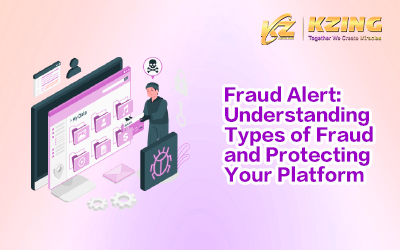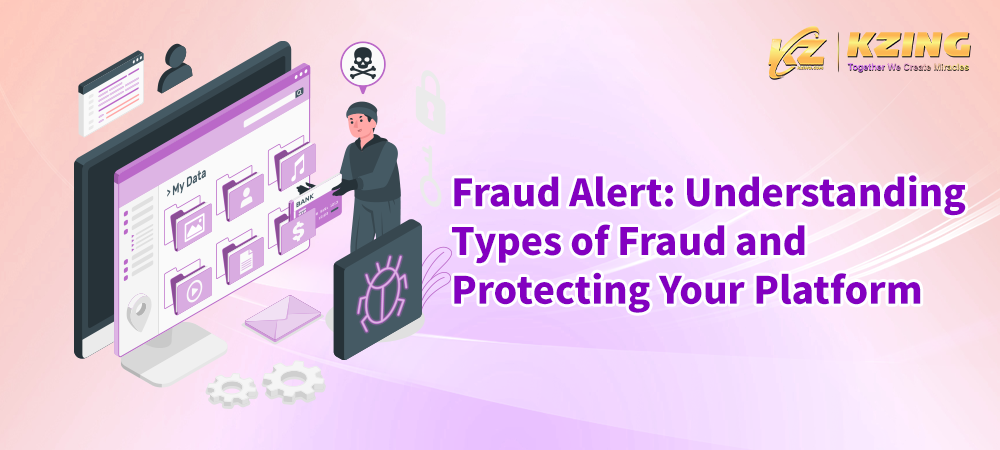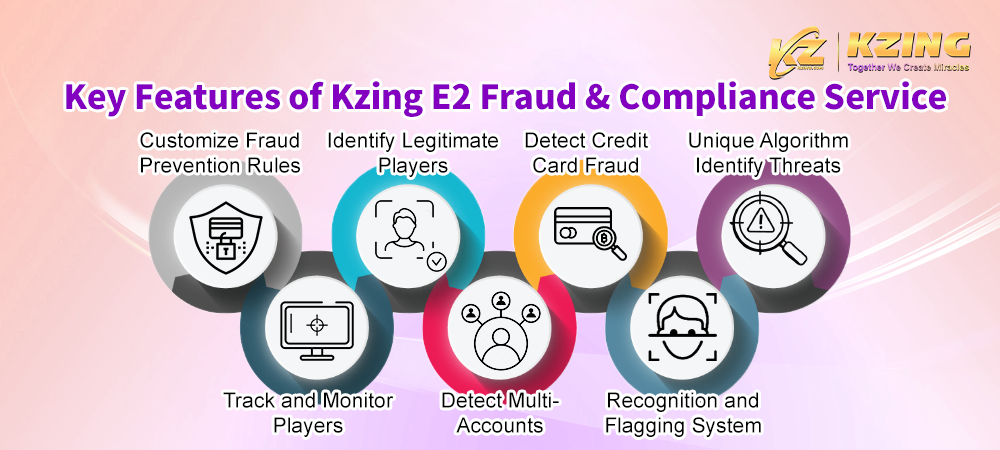

The iGaming industry is booming, expected to exceed $172.2 billion by 2030, but with this growth comes a surge in fraud. In Q2 of 2021, suspected digital fraud in iGaming increased 393% from the previous year, threatening both players and platforms. Companies facing fraudulent activities can suffer from damaged reputations, substantial financial losses, and legal consequences. Inadequate fraud management not only undermines brand trust but can also drive customers toward competitors, ultimately leading to revenue loss. Combating these fraudulent activities requires sophisticated strategies and advanced technologies such as Kzing E2 Fraud & Compliance Service.
Table of Contents
What is Online Gambling Fraud?
Online gambling fraud encompasses various deceptive tactics used to exploit iGaming platforms and their users. This includes user-related fraud like cheating, account takeovers, and bonus abuse. These platforms also attract hackers, money launderers, and chargeback fraudsters, causing significant harm to their operations, reputations, and financial stability.
Types of Online Gambling Fraud
1. Chargeback Fraud
Chargeback fraud occurs when customers use the chargeback mechanism provided by credit cards to dispute legitimate transactions. Players who lose money in a game may claim their card was stolen or used without permission, resulting in the bank reimbursing them from the platform’s account. This can lead to substantial financial losses for the platform, even if the website challenges the claim.
2. Account Takeover (ATO) Attacks
Account takeovers involve fraudsters using stolen login credentials to gain control of legitimate player accounts. This can lead to unauthorized activities, including changing account details and initiating chargebacks, as well as exploiting bonuses or withdrawing funds.
3. Bonus Abuse
Bonus abuse involves creating multiple accounts to exploit promotional offers. Fraudsters may use fake or stolen personal information to register multiple accounts, then claim bonuses repeatedly. This practice can devalue legitimate promotions and create additional costs for iGaming platforms.
4. Affiliate Fraud
Affiliate fraud involves cybercriminals using deceptive tactics to earn commissions from iGaming platforms. This can include generating fake leads, using bots to create accounts and make deposits, or manually entering fraudulent data into the platform’s CRM system.
5. Payment Fraud
Payment fraud involves the use of stolen credit card information or other payment details to make unauthorized transactions. Fraudsters may deposit stolen funds into an iGaming account and then attempt to cash out quickly, leading to significant financial risks for platforms.
6. Multiple Account Fraud
This form of fraud involves a single individual creating multiple accounts to gain an unfair advantage in games like poker. When a fraudster controls several accounts in a single game, they can manipulate the outcome to their benefit, harming the integrity of the game and other players.
How Kzing Can Help Protect Your Platform From Fraud?
Kzing E2 Fraud & Compliance Service offers a comprehensive solution to detect and prevent fraudulent activities.

- Advanced Fraud Detection System: Kzing E2 system uses advanced algorithms to analyze and score key data points such as registration, login, transactions, and other on-site activities to identify potential fraud.
- Comprehensive Fraud Prevention: The service eliminates fraudulent activities such as bonus abuse, credit card fraud, and more, while also analyzing issues like multi-accounting and preventing account takeovers.
- Minimization of False Positives: Kzing E2 system reduces false positives, preventing unnecessary delays, manual reviews, or account suspensions.
- Real-time Threat Detection: The service detects and responds to threats quickly without affecting user experience.
- Monitoring User Behavior: Kzing E2 system monitors user behavior across different domains and pages, helping to trace and prevent multiple account fraud and bonus abuse.
- Effective Response and Tracking: The system tracks players who trigger alerts, associating them with specific IP addresses or regions, allowing platforms to maintain effective watch lists.
Conclusion
iGaming businesses face significant challenges in monitoring and preventing fraud, with various forms of deception threatening their operations and customer trust. Understanding the types of fraud and implementing effective fraud detection and compliance measures is essential for maintaining platform integrity.
Don’t let fraudsters undermine your success—equip your platform with the best-in-class Kzing’s E2 Fraud & Compliance Service. Contact us now to learn more about how we can help you safeguard your platform and your players.










